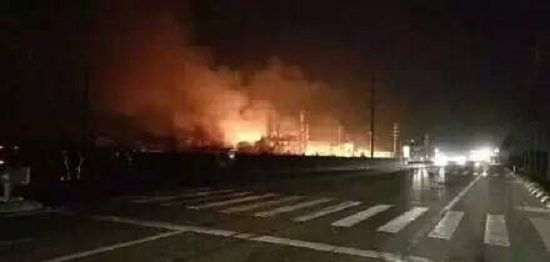More than 130 people have died in work accidents in the two months since the massive explosions at a chemical warehouse in Tianjin which killed 173 and injured hundreds of others on 12 August 2015.
In the immediate aftermath of Tianjin, Chinese officials from Premier Li Keqiang down promised to overhaul work safety in China but since then the official Chinese media has reported another 84 incidents, which have now been logged on CLB’s Work Accident Map. This figure excludes the landslide at a Shaanxi mine that killed 65 miners and their families a matter of hours before the Tianjin explosions.
Soon after the Tianjin tragedy, government officials submitted plans to relocate or upgrade nearly 1,000 chemical plants currently in close proximity to residential areas. But on 23 August, a chemical plant explosion killed one worker and injured nine others in Zibo, Shandong. One week later, a chemical plant explosion killed 13 workers and injured 25 in Dongying, also in Shandong.

Chemical plant explosion in Zibo, Shandong on 23 August 2015. Photograph taken from Weibo
On 26 August, four workers died and one was injured when fire spread through a warehouse in Wuhan that was storing flammable car cleaning materials. In addition, the State Council’s Work Safety Commission reported that there had been seven major fires in the first two weeks of September, with four incidents on 9 September alone.
Other industries, like construction and street sweeping, get less attention, but are equally dangerous. Since the Tianjin blast, CLB’s Accident Map has recorded one deadly accident in the construction industry every two days on average. And at least ten sanitation workers have been killed on the job in the last two months, with four killed in separate incidents in three days from 10 to 12 September.
The discussion in the official media following this latest string of sanitation worker deaths largely failed to offer any concrete suggestions. One article asked “who will protect the angels of the road?” but interviewees could only suggest that citizens should refrain from littering out of respect for low-wage workers.
Another article in the Modern Express criticized a so-called safety initiative in Jiangsu that required sanitation workers to wear GPS trackers to protect them in the event of an accident. Workers in the Jiangsu city of Nantong complained that devices were used to track their movements and allowed the company to fine them for failing to complete their work on time. Workers said the devices made them feel like criminals, and one netizen asked why if the company had money to pay for GPS systems it did not increase the workers’ wages.
Finally, in mid-September, the State Administration of Work Safety called for public comment on draft implementing regulations for the Work Safety Law. The draft called for stricter rules and increased bureaucracy on work safety, including requiring that enterprises that handle dangerous materials and employ more than 100 workers should have at least one work safety manager. Nowhere in the draft however is there any discussion of the role of workers or the trade union in improving work safety.
